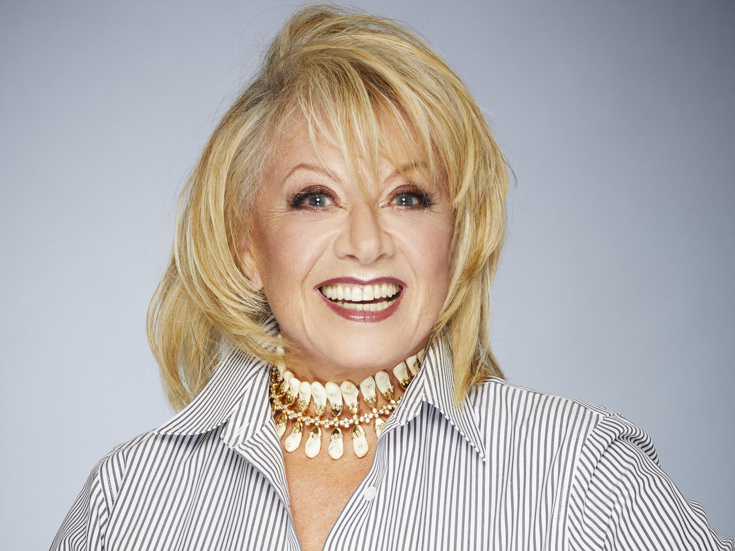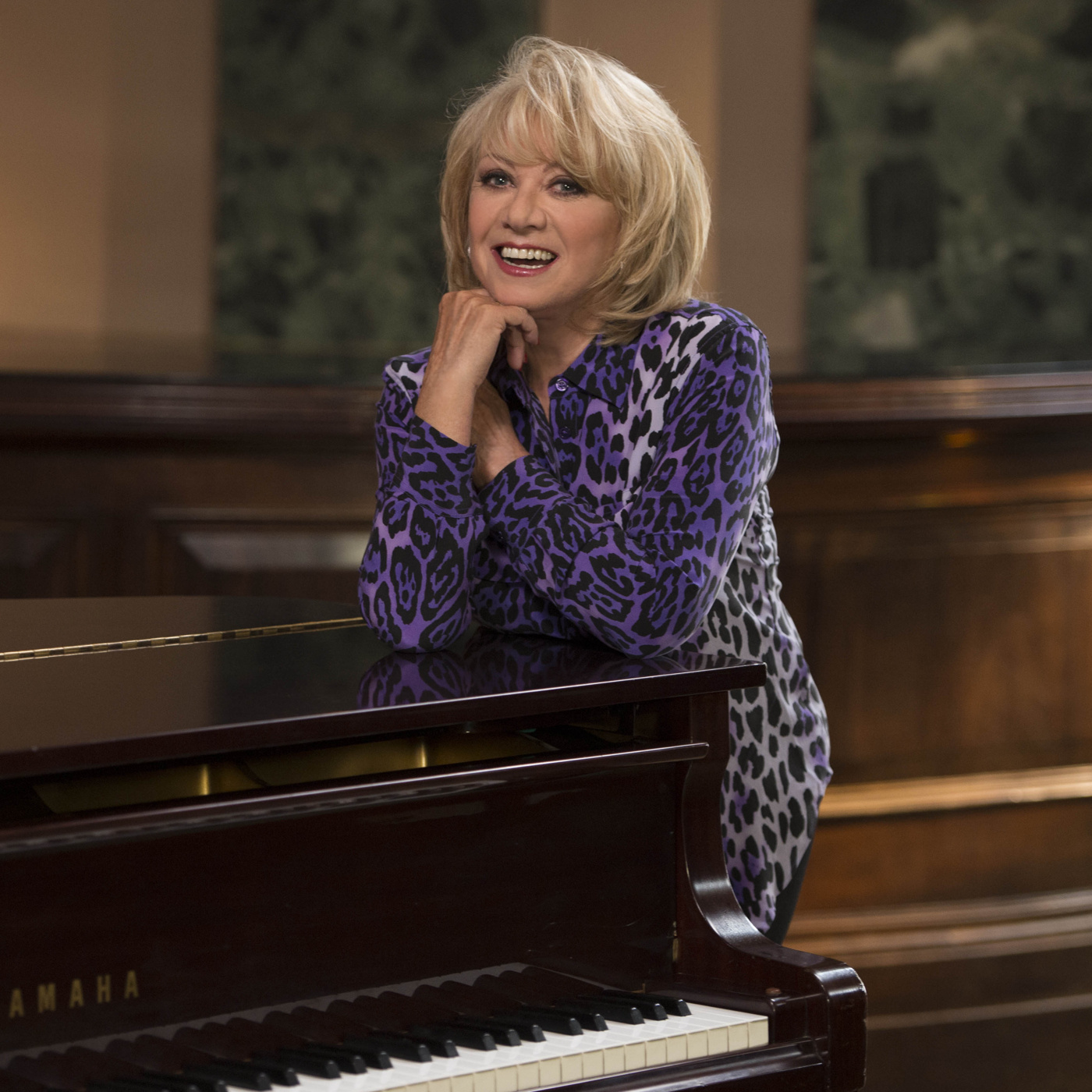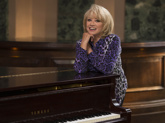Elaine Paige on Being Known as the 'First Lady of the British Musical Theater,' Her Successful Radio Show & More

(Photo: Nicky Johnson)
Elaine Paige needs scant introduction as the “first lady of the British musical theater,” a title that the veteran star of Evita, Cats, Chess and Sunset Boulevard, to name just a few of her many and varied triumphs, has carried with grace and ease for some years now. But Paige has been able to add to her resume the cachet and acclaim that come from hosting a weekly theater-intensive program on BBC Radio 2, Elaine Paige On Sunday, that can now be heard on Broadway.com. What better time, therefore, to catch the beloved entertainer for an expansive late-morning chat that Broadway.com will be presenting in two parts, so as not to let a moment of Paige’s sparky and lively conversation go unreported.
How did you make the shift to radio personality, which isn’t the kind of thing you tend to find Broadway musical legends trying their hands at?
It’s an interesting phenomenon, and for me it came about in the most unlikely way. It was 2004, I suppose, and it was one of those things where I was giving an interview to promote an album and was telling anecdotes and stories and presumably being amusing, I don’t know. Within a couple of days [the radio producers], rang my manager and no one could have been more than amazed than me.
What was your reaction at the time?
That was really the first instance in this country of anyone connected with the theater being asked to host a radio program and it was interesting because, unlike theater, radio is an intimate medium that you sort of have to learn how to do. It’s so vastly different from the theater, which is often about big bold strokes, whereas this is really about sitting and chatting to people as if you were sitting around the kitchen table.
How did you adapt to the format?
Quite quickly I realized that I had this wonderful direct contact with the audience, which was sort of like a friendship, though perhaps a one-sided friendship [laughs]! After immersing myself in the theater for all of my career, I found the whole experience rather liberating: it was if suddenly I had found my own voice, which was a wonderful thing.
Did you feel, in career terms, as if you’d been handed a new and wonderful outlet?
Yes, and also an education! Here I was suddenly given the opportunity to do interviews with some of my idols over the years—Burt Bacharach or Jerry Herman or Stephen Schwartz—these people I had grown up listening to and now had the opportunity to talk to, which was an absolute joy. I got to interview practically everyone I’ve ever wanted to find out about, from Angela Lansbury and Jerry Zaks, whom I had worked with [on Anything Goes in the West End] to Elton John. It was wonderful to be able to reacquaint myself with these people in this new form.

What was the climate, in showbiz terms, facing you at the time?
Initially when we first talked about what the show might be, the genre of musical theater wasn’t really dealt with at all on radio in England. And because nobody dealt with it, we thought we would give it a try for six months and see how the public might take to it and whether or not they would.
Were you surprised at the response?
I’d always thought of what we do as an eclectic show that just the hard-core musical theater fans might enjoy and in fact it proved the complete opposite. It was if people had been given a voice and now we have two and a half or three million listeners in the U.K. and many more listening abroad thanks in no small part to Broadway.com. I’ve always had wonderful letters from people all over the world and now, with modern devices like iPlayer, people can tune into the program in that way, too.
Are there particular people you’ve not been able as of yet to get on the program who remain on your wish list?
There are two. One is Stephen Sondheim, who I am still after and every time I’ve approached him he has been working on something or other and wasn’t available, and the other is Barbra Streisand. I’ve managed to get the other great stalwarts and idols. I was able to talk to Liza Minnelli about her father and about Judy Garland, and I’d always wanted to talk to Angela Lansbury because she’s English, primarily, and it was so exciting to be able to chat with her about Gypsy and Mame and those fantastic shows. Other people have been extraordinary, too: Thomas Schumacher, CEO of the theater wing of Disney, whom I was able to talk to about the advent of the Disney empire on Broadway.
How did you feel when other British musical theater names, like Michael, Ball, started hosting shows on BBC radio as well?
Some years later, Michael followed suit [with The Michael Ball Show, also on Radio 2], but his show is very different from mine. Mine is solely focused on musical theater and musical film, whereas his is a little bit of everything, so it’s a very different beast indeed. The result is that there isn’t a lot between our shows that we can trade, to be honest, but we’re good friends and it’s nice that we both now have these programs.
Is it a challenge when you find yourself hosting a segment on a show to which you were once intimately connected—like when the Open Air Theatre in Regent’s Park this past summer revived Evita, a show (and part) which you, of course, originated on the West End in 1978?
I think with shows you’ve been in or had the luck and fortune to create, as I did with Evita, that 40-plus years on you have to let go of the fact that you were even in it. At the same time, you have to speak as you find, and I did find it an extraordinary production, although I can’t honestly say that I think it ticked all the boxes.
What did you feel was missing?
The one thing I thought they missed entirely, which was sort of the hook one hung one’s hat on, was the fact that Eva Peron came from lowly beginnings. She was working-class, so that when she made it to the point that she was standing on the balcony of the Casa Rosada, there she was looking stunningly glamorous in all her jewels and furs and she was able to say, “Look, I have come from nothing: this is what I have managed to achieve, and you too can have this.” She was giving the working classes hope, and that wasn’t anywhere to be seen in [the Regent’s Park] production.
Are you nonetheless generally in favor of revivals, like this latest London Evita, that attempt to refashion the material in some way?
I am, and there were lots of things about the Open Air Evita that I did like! It’s possible to view these musicals simply as period pieces when, in fact, life has changed, and I admire the fascinating new takes that directors and creative teams are coming up with. When I was in New York this past year for the Tony Awards, I went to see the [Tony-winning revival] Oklahoma! and sat there watching this brand new vision and thinking to myself, “Goodness, I don’t remember hearing some of this dialogue before.” It was only later that I realized that what I was hearing was all actually verbatim in the original but that the creative team had made it into something fresh. When that happens, it’s rather marvelous.
Do you ever wonder whether you’ve got the makings, perhaps, of a critic, given the acumen you’re honing with time?
[Laughs] No, I don’t think so. I read the critics obviously on my show, but I think with Evita, it was slightly different. I did feel I could have a genuine say about it having been involved in the original production. But as an artist first and foremost, I don’ t want to become a critic. I’ll leave that to the people who love language and are good with words.
Is it more about having a growing confidence in your own opinions?
I think that’s it. I’m just starting from my own reaction and the more one sees, the more you develop that response. I’m not afraid of my opinion anymore, and that’s something that being the host of a radio program has given me: I’ve found my own voice.
How does that feel?
It’s wonderful in later life to feel as if you can have your own opinion. It’s another means of me being liberated.
On a similarly pioneering front, how did you come by the title which adheres to you to this day as the “first lady of the British musical theater”?
Well, I must have done a few musicals before it was applied! I can't actually remember where it comes from, but, of course, it's very flattering. I did a performance during the 1980s for President Reagan at the White House, so it might well have been a phrase the press applied after that event, since it's the kind of language we're used to hearing coming out of the White House. I've been told I have appeared in more musicals—well over 20—than anyone else of my generation, so whatever its origins, it's an extraordinary moniker.
